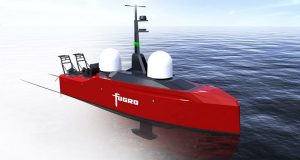It’s January 14, 2024, and Accession 500, a small Uncrewed Surface Vessel (USV), is riding the waves around Bonny into the history books of survey in the oil industry in Nigeria. Remotely controlled by personnel on shore, the USV runs along survey lines on a pipeline route powered by diesel engines, in the first crewless survey in Nigeria deployed by The Shell Petroleum Development Company of Nigeria (SPDC) Ltd.

The survey ran non-stop for 166 hours and the results came in real-time with better quality data.
“We’re excited at the improvements in the new face of survey in Nigeria,” said SPDC’s Chief Surveyor and Head, Offshore Survey Operations, Steve Keedwell. “It would have taken greater time and effort and cost more money to mobilise personnel and materials for this type of survey with high energy consumption, safety exposure and the risk of low-quality data. The results came in faster with higher quality as the human element was reduced to its barest minimum.”
SPDC had these benefits in mind when it began efforts to introduce crewless survey in 2019 after the technology was successfully tested and deployed in other Shell Operating Units. The restrictions on physical presence at work sites at the time due to covid-19 restrictions helped to speed up the process.
The company also saw an opportunity to further develop Nigerian content and worked with an indigenous vendor, Compass Survey Ltd which deployed the vessel with support from their technical partners, Unmanned Survey Solutions, UK.
Bonny was the choice for the first survey because of a project around the landfall area which required using a vessel with very shallow draft. An uncrewed vessel was the answer as it reduces exposure to health, safety an environment due to the shallow water area that needed to be surveyed.
Project manager Compass Survey Ltd, Joshua Oriero, who monitored the exercise, said: “The Bonny deployment was a huge success. The team comprised pilots, surveyors, an engineer, data processors and an onsite remote operator for human intervention where necessary. The USV was operated and monitored remotely through a secure internet connection. The unit was set to travel to the survey location, and it started running the survey lines already programmed into the autopilot system.”
There was a drastic reduction in carbon emission. For example, less than 27 litres of diesel were consumed per day, compared to more than 1,500 – 6,000 on traditional vessels depending on the size. The amount of energy saved would even be higher over the seven days of a typical deployment.
Previously, human error during offset measurements and calibration posed significant challenges in surveys. Purpose-built USVs equipped with permanently mounted sensors eliminate these error sources, leading to improved data quality due to the reduction of noise from generators usually used on crewed vessels.
General Manager, Nigerian Content Development, SPDC, ‘Lanre Olawuyi, is happy with the prospects of the technology in Nigeria.
“Despite concerns about job losses, crewless surveys will create new employment opportunities. The contractor and their technical partner have already trained a Nigerian remote operator in Bonny. As this technology expands, more people will gain skills as engineers, remote helmsmen, data processors and online surveyors to support uncrewed surveys, along with USV maintenance personnel. SPDC will continue to support Nigerian companies to take advantage of the evolving opportunities through its vendor development programmes,” he said.
SPDC is looking to apply the lessons from the Bonny exercise in future deployments. These include availability of spare parts to avoid delay in repairs, the need for a robust system to manage the large volume of data acquired in a short time and the presence of fishing nets on the survey route. But the main lesson is that, given the vast improvement in data quality and safety, coupled with flexibility and ease of deployment, the new face of survey in Nigeria has a bright future.
